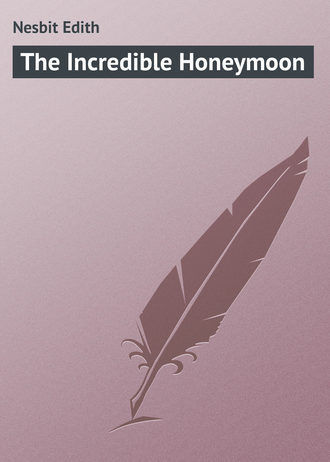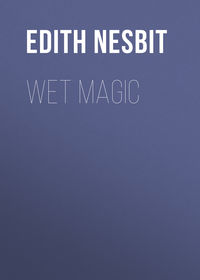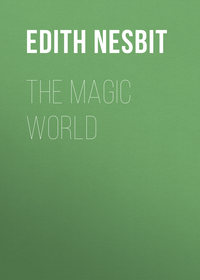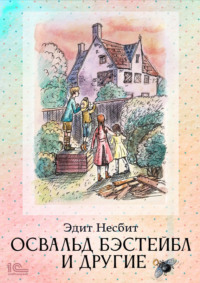 полная версия
полная версияThe Incredible Honeymoon
"See 'ere, gov'ner," he said, low and hoarse and exactly like a conspirator, "I couldn't bleat it out for all the country to hear while yer was down in the lock, but I knows as you're wanted and yer may think it lucky it's me as come after yer and not the gov'ner nor yet the police."
"I do really think," said she, softly, "that you're making a mistake. The police don't really want us."
"Oh, I got a bit of candle," was the unexpected rejoinder. "Get the young lady to hold the cloak up so as it don't shine from 'ere to Tunbridge to give yer away like, and yer light the dip and 'ave a squint at this 'ere."
He held out the candle and matches and a jagged rag of newspaper.
"'Ere," he said, "'longside where I'm 'olding of it."
She made a sort of screen of the cloak. Edward lit the candle, and when the flame had darkened and brightened again he read as follows:
Missing – Young lady, height five feet six, slight build, dark hair and eyes, pale complexion. Last seen at Jevington, Sussex. Wearing black chiffon and satin dress, black satin slippers, and a very large French circular cloak with stitched collar. Has no money and no hat. Twenty pounds will be paid to any one giving information as to her whereabouts.
"Well," said Edward, blowing out the candle, "this lady has a hat, as you see, and she hasn't a black dress and satin slippers. Thank you for letting us through; here's something to get a drink with. Hand over the crowbar, please, and good night to you."
"Not so fast, sir," said the man, still holding on, "and don't make to jab me over the fingers with the boat-'ook, like what you was thinking of. I'm your friend, I am. I see that piece in the paper 'fore ever a one of them, but I never let on. That's why the gov'ner sent me, 'cause why – 'e didn't think I knowed, and 'e means to 'ave that twenty pounds hisself."
"But," said she, "you see, I have got a hat and – "
"Yes, miss," said the man, "an' you've got the cloak, large and black and stitched collar, and all; it's that what's give yer away."
"But supposing I was the young lady," she said, grasping Edward's arm in the darkness, and signaling to him not to interfere with feminine diplomacy, "you wouldn't give me up to the police, would you? I wouldn't give you up if the police wanted you."
"'Course I wouldn't," he answered, earnestly. "Ain't that what I'm a-saying? I'm 'ere to 'elp yer do a bolt. The minute I saw that there bit in the paper I says to myself, 'It's them,' and why shouldn't I 'ave the twenty pounds as well as any one else?"
"There," said Edward, in a low voice, "you see! Let me deal with him."
But again her hand implored. "You're going to give us up to the police for twenty pounds?" she said, reproachfully.
He groaned. "'Ow yer do talk!" he said. "Women is all alike when it comes to talking. Stop talking and listen to me. Can't yer understand plain words? What yer got to do is to leave the boat at Mutton Worry Lock – that's three locks up – bunk across the fields to Tunbridge. If yer got money enough – and I'm sartain yer 'as, by the looks of yer – yer 'ire one of them motors and get away as fast as yer can. Get one at the Castle. Say yer going to Brighton, and when yer get away from the town tell the chap to drive t'other way."
"That's a good plan," said she.
"I mapped it all out as I come along," he said, with simple pride. "And, mind yer, I'm trusting yer like I shouldn't have thought I'd 'a' trusted nobody. 'Ave yer got the twenty pounds about yer?" he asked, anxiously.
"No," said she.
"Can't be helped, then." He breathed a sigh of resignation. "I'll just give yer my direction and yer send the ready to me. 'Oo says I don't trust yer?"
"You mean," said Edward, slowly, and would not be checked any longer by that hand on his arm – "you mean that you expect us to give you twenty pounds not to give us up to the police? The police have nothing to do with us. The whole thing's moonshine. Take your hand off the boat and get along home."
"Any man," said he who had been called Neptune – "any man as had the feelings of a man would think of this – young lady. Even if yer was to prove to Poad as yer wasn't wanted for nothin' criminal – it's none so easy to make Poad see anything, neither" – he ended, abruptly, and began anew. "Look 'ere, gov'ner, on account of your lady I say do a bolt. An' why should I be the loser? I only got to stick to the boat, whichever way yer go – up and down – and soon as yer land where there's a copper, lagged yer'll be to a dead cart, and only yourself to thank for it. Whereas I'm only trying to be your friend, if you'd only see it."
"I don't see why you should be so friendly," said Edward, now entirely losing control of the situation.
"Nor I shouldn't see it, neither, if it was only you," was the rejoinder.
"He's quite right," she whispered. "Promise what he wants and let's get away. I know exactly what Poad is like. We should never make him understand anything. I couldn't bear it. Let's go. If you've got twenty pounds, give it to him and let's go."
"Think of your young lady," repeated the voice out of the darkness. "If yer promise to let me 'ear by the post, I'll take your word for it. I'm your true friend, and I knows a gentleman when I sees one."
"If you were a true friend," said Edward, "you wouldn't want paying for minding your own business."
"Aw, naw," he said, "'old 'ard, gov'ner. Ain't it a man's own business when there's twenty pounds to be made? Says I to myself, if it's worth some one's while to pay the money to catch 'er, it's well worth the gentleman's while to shell out and keep 'er, and.."
"Oh, hold your tongue!" said Edward. "Go on ahead and get the next lock ready. I'll give you the money. The lady wishes it."
"She's got her 'ead the right way on," said the friend in need. "Pull ahead, sir."
"But you can't, with your finger like that," she said. "I'll pull."
"Why not let me?" Neptune suggested. "We'd get there in 'alf the time," he added, with blighting candor.
So Neptune pulled the boat up to Mutton Worry Lock and the two crouched under the cloak. Charles, who might have been expected to be hostile to so strange a friend, received him with almost overwhelming condescension. At Mutton Worry Lock the deliverer said:
"Now 'ere yer deserts the ship, and 'ere I finds 'er and takes her back. And look 'ere, sir, I'm nobody's enemy but my own, so I am. And of course if I was to 'ave the twenty pounds it's my belief I'd drink myself under the daisies inside of a week. Let me 'ear by the post – William Beale, care of the Anchor Hotel – and send me ten bob a week till the money's gone. It'll come easier to yer, paying it a little at a time like – and better for me in the long run. Yer ought to be a duke, yer ought. I never thought you'd 'a' ris' to the twenty. I'd 'a' been satisfied with five – and that'll show yer whether I'm a true friend or not."
"I really think you are," she said, and laughed gently. "Good-by."
"Good evening, miss, and thank yer, I'm sure. Never say good-by; it's unlucky between friends."
"Here's a sovereign," said Edward, shortly. "Good night. You're jolly fond of the sound of your own voice, aren't you?"
"Sort of treat for me, sir," said Beale, always eagerly explanatory. "Don't often 'ear it. D'you know what they calls me at the Anchor, owing to me 'aving learnt to keep my tongue atween my teeth, except among friends? 'William the Silent's' my pet name. A gent as comes for the angling made that up, and it stuck, it did. Bear to the left till you come to the boat-'ouse, cater across the big meadow, and you'll hit Tunbridge all right, by the Printing Works. So long, sir; so long, miss."
Thus they parted.
"What an adventure!" she said; "and I believe William the Silent believes himself to be a model of chivalrous moderation. He would have been satisfied with five pounds."
"I believe he would, too," said Edward, with a grudging laugh. "It's your beaux yeux. The man has gone home feeling that he has as good as sacrificed fifteen pounds to a quixotic and romantic impulse. Wretched blackmailer though he is, he could not resist a princess."
"I like William," she said, decisively. "After all, as he says, one must live. Let's leave the cloak under this hedge. Shall we? It's like getting rid of the body. And I'll buy a flaxen wig to-morrow. And do you think it would be a help if I rouged a little and wore blue spectacles? It will be the saving of us, of course."
"I hope to heavens we get a motor in Tunbridge," said he. "You must be tired out."
"I'm not in the least tired," she said. "I'm stepping out like a man, don't you think? I've enjoyed everything beyond words. What a world it is for adventures once you step outside the charmed circle of your relations. Look at all the things that have happened to us already!"
"I didn't mean anything to happen except pleasant things," said he.
"Ah!" she said, with a fleeting seriousness, "life isn't like that. But there's been nothing but pleasant things so far – at least, almost nothing."
"Won't you take my arm?" he said.
"What for?"
"To help you along, I suppose," he said, lamely.
She stopped expressly to stamp her foot. "I don't want helping along," she said. "I'm not a cripple or a baby – and – "
He did not answer. And they walked on in silence through the starry, silent night. She spoke first.
"I don't want helping along," she said. "But I'd like to take your arm to show there's no ill-feeling. You take an arm on the way to dinner," she assured the stars, "and why not on the way to Tunbridge?"
The way to Tunbridge was short. They found a car, and the night held no more adventures for them.
But in a sheltered nook in the weir stream below Jezebel's Lock a candle set up on a plate illuminated the green of alder and ash and the smooth blackness of the water, shedding on a lonely supper that air as of a festival which can only be conferred by candle-light shining on the green of growing leaves. There, out of sight of the towing-path, Mr. William Beale, charmed to fancy and anticipation by the possession of a golden milled token, made himself a feast of the "broken vittles" in the derelict Midlothian basket, and in what was left of the red wine of France toasted the lady of his adventure.
"'Ere's to 'er," he said to the silence and mysteries of wood and water. '"Ere's to 'er. She was a corker, for sure. Sight too good for a chap like 'im," he insisted, adding the natural tribute of chivalry to beauty; drank again and filled his pipe. Edward, from sheer force of habit, had smoothed the parting with tobacco.
"Not but," said William the Silent – "not but what I've known worse than 'im, by long chalks. Ten bob a week – and 'e'll send it along, too – good as a pension. 'E'll send it along."
He did. William the Silent had not misjudged his man.
XI
THE GUILDHALL
"WHERE is Charles?" she asked next day.
Edward had called for her early, had paid the Midlothian's bill and tipped the Midlothian's servants, and now they were in a taxi on their way to Paddington. She had definitely put her finger on the map that morning, and its tip had covered the K's of Kenilworth and Warwick. She was still almost breathless with the hurry with which she had been swept away from the safe anchorage of the hotel, "and couldn't we have the hood down?" she added.
"Charles," said Edward, "is at present boarded out at a mews down Portland Road way, and I think we'd better keep the hood up. Look here! I never thought of the newspapers. This is worse than ever."
He handed her the Telegraph. Yesterday's advertisement was repeated in it – with this addition:
May be in company with tall, fair young man. Blue eyes, military appearance. Possesses large, white bull-terrier.
"Oh dear! They'll track us down," she said, and laughed. "What sleuth-hounds they are! But they can't do anything to me, can they? They can't take me back, I mean. I'm twenty-one, you know. Can't you do as you like when you're twenty-one?"
She looked at the paper again, and now her face suddenly became clouded and her eyes filled with tears. "I never thought of that." She hesitated a moment and handed him the paper, pointing to the place with the finger that had found Warwick and Kenilworth. Below the advertisement touching the young man and the bull-terrier, he read:
Silver Locks – Come back. I am ill and very anxiousAunt Alice."That means..?"
"It means me. I'm Silver Locks – it's her pet name for me. I called my aunts the three bears once, when I was little, in fun, you know. And the others were angry – but she laughed and called me Silver Locks. And she's called it me ever since. I never thought about her worrying. What am I to do? I must go back. I thought it was too good to last, yesterday," she added, bitterly.
He put the admission away in a safe place, whence later he could take it out and caress it, and said, "Of course you must go back if you want to. But don't do it without thinking. We meant to talk over our plans yesterday, but somehow we didn't. Let's do it to-day."
"But I can't go to Warwick. I must go back to her – I must."
"If you do," he said, "you won't go back to just her – you'll go back to the whole miserable muddle you've got away from. You'll go back to your other aunts and to your father. Besides, how do you know who put that advertisement in? Think carefully. Is the advertisement like her?"
"It's like her to be anxious and kind," said she.
"I mean, is she the sort of woman to advertise that she's ill? To advertise your pet name – and her own name – so that every one who knows you both and sees the advertisement will know that you are being advertised for? Is that like her?" He ended, astonished at his own penetration.
"No," she said, slowly, "it isn't. And it isn't like her to say she's ill. She never complains."
"She wouldn't use her illness as a lever to move events to her liking?"
"Never!" she said, almost indignantly.
"Then I think that this advertisement is some one else's. Where does she live."
"Hyde Park Square."
"Let us telegraph her, and not go to Warwick."
They stopped the taxi and composed a message. He despatched it.
Did you put advertisement in paper to-day? And are you ill? I am quite well and will write at once. Wire reply to Silver Locks, General Post-Office.
Then they told the man to drive around Regent's Park, to pass the time till there should be an answer.
In the park the trees were already brown, and on the pale, trampled grass long heaps of rags, like black grave-mounds, showed where weary men who had tramped London all night, moved on by Law and Order, inexorable in blue and silver, now at last had their sleep out, in broad sunshine, under the eyes of the richest city in the world. Little children, dirty and poor – their childhood triumphant over dirt and poverty – played happily in the grass that was less grass than dust.
"What a horrible place London is!" she said. "Think of yesterday."
That, too, he put away to be taken out and loved later.
"We won't stay in London," he said, "if the answer is what I think it will be. We'll go out into the green country and decide what we're going to do."
"But if she did put the advertisement in, it means that she's very ill. And then I must go to her."
"But if she didn't – and I more and more think she didn't – they may send some one to the General Post-Office post-haste – so it won't do for you to go for the telegram. Do you know the Guildhall Library?"
"No."
"It's a beautiful place – very quiet, very calm. And the officials are the best chaps I've ever found in any library anywhere. We'll go there. You must want to look up something. Let's see – the dates of the publication of Bacon's works. Write your name in the book – any name you like, so long as it isn't your own; then ask one of the officials to help you, and go and sit at one of the side tables – they're like side chapels in a cathedral – and stay there till I come. You'll be as safe and as secret as if you were in the Bastille. And I'll baffle pursuit and come to you as soon as I can."
"Yes," she said, meekly.
"And don't worry," he urged. "The more I think of it, the more certain I am that it was not the aunt you like who wrote that advertisement – "
He was right. The telegram with which, an hour later, he presented himself at the Guildhall Library ran thus:
I did not write advertisement and I am not specially ill, but I am very anxious. Write at once. Aunt Loo and Aunt Enid are both here. I think they must have inserted the advertisement. A.
"Your Aunt Alice is a sportsman," he said, "to warn you like that."
"I told you she was a darling," she answered – and her whole face had lighted up with relief – "and you are the cleverest person in the world! I should never have thought about its not being her doing, never in a thousand years. You deserve a medal and a statue and a pension."
"I don't deserve more than I've got," said he, "nor half so much. The sun shines again."
She flashed a brilliant smile at him, and pushed a brown book along the table.
"I suppose we ought to look studious," she said, "or they'll turn us out. I am so glad Aunt Alice isn't really worse. You don't know how I've felt while you've been away. It seemed so horribly selfish – to have been so happy and all while she was ill and worried. But, of course, you do know."
"Let us go out," he said, putting the books together.
"Yes," she said, "I know all about Bacon. Not that I'll ever want to know."
"I'm not so sure," said he. "Did it ever occur to you that perhaps the Baconians are right, and he was an intellectual giant, almost like Plato and Aristotle rolled into one? We'll go to Stratford some day, and look at Shakespeare's bust and see if we think he could have written 'The Tempest.'"
"You shouldn't judge people by their faces," she said. "Handsome is as handsome does."
"Oh, but you should," said he. "It's handsome does as handsome is. I always go by appearances. Don't you? But of course, I know you do – "
She opened one of the books and began to turn the pages. "Look what I found," she said, and all the time their voices had been lowered to the key of that studious place. "Look, isn't it pretty? And do you see? – the e's are like the Greek θ. Can you read it?"
He read:
"Fair Lucrece, kind Catherine, gentle Jane,But Maria is the dearest nameRobert Swinford, 1863.""Yes, that's what I make it. It doesn't rhyme, but I expect Maria was very pleased. Do you think they were studying with a stern tutor, and he wrote that and pushed it over to her when no one was looking? It's an odd thing to have written in a Natural History book. There's something more on another page – but it doesn't make sense:
"I am true rew Hebrew – CXIX – 101.""I expect he was just trying a pen. Come, the librarian has his scholarly eye on you."
"I should like to look through all the old books and find out all the names people have written and make stories about them," she said, and he received the curious impression that she was talking against time; there was about her a sort of hanging back from the needful movement of departure. He picked the books up and carried them to the counter, she following, and they walked in silence down the gallery hung with Wouvermans and his everlasting gray horse.
"Let's go into the Hall," he said. So they turned under the arch and went into the beautiful great vaulted Guildhall, where the giants Gog and Magog occupy the gallery, and little human people can sit below on stone benches against the wall, and gaze on the monuments of the elder and the younger Pitt, and talk at long leisure, undisturbed and undisturbing, which is not the case in the Library, as Edward pointed out.
"Now, then," he began.
"Yes," she said, hurriedly. "Something will have to be done about Aunt Alice."
"Yes. But what?"
"I don't know." She turned and leaned one hand on the stone seat so that she faced him. "You do believe that I don't regret coming away? I think it would have been splendid to have gone on – like yesterday – but you see it's impossible."
"No, I don't," he said, stoutly.
She made a movement of impatience. "Oh yes, it is – quite," she said. "However rich you are, you can't go on forever being blackmailed. Every one would know us, or else you'd have to give up Charles, and even then I expect you'd be obliged to pay twenty pounds every three-quarters of an hour. It can't be done. And, besides, we should never know a moment's peace. Wherever we went we should imagine a blackmailer behind every bush, and every one we spoke to might be a detective. It's no use. I must go back. Do say you know I must."
"I don't."
"Well, say you know I don't want to."
"I can't say that.. because, if you don't want to.. there's always the old alternative, you know." He was looking straight before him at the majestic form of the Earl of Chatham.
"What alternative?"
"Marrying me," he said, humbly. "Do. I don't believe that you'd regret it."
"When I marry," she said, strongly, "it won't be just because I want to get myself out of a scrape."
"I hoped there might be other considerations," he said, still gazing at the marble. "You were happy yesterday. You said so."
"You talk as though marrying were just nothing – like choosing a partner for a dance. It's like – like choosing what patterns you'd be tattooed with, if you were a savage. It's for life."
"And you can't like me well enough to choose me?"
"I do like you," she answered, with swift and most disheartening eagerness, "I do like you awfully; better than any man I've ever known – oh, miles better – not that that's saying much. But I don't know you well enough to marry you."
"You don't think it would turn out well?"
She faltered a little. "It – it mightn't."
"We could go on being friends just as we are now," he urged.
"It wouldn't be the same," she said, "because there'd be no way out. If we found we didn't like each other, to-morrow, or next month, or on Tuesday week, we could just say good-by and there'd be no harm done. But if we were married – no – no – no!"
"Do you feel as though you would dislike me by Tuesday week?"
"You know I don't," she said, impatiently, "but I might. Or you might. One never knows. It isn't safe. It isn't wise. I may be silly, but I'm not silly enough to marry for any reason but one."
"And that?"
"That I couldn't bear to part with him, I suppose."
"And you can bear to part with me. There hasn't been much, has there? Just these three days, and all our talks, and.." He stopped. A tear had fallen on her lap. "I won't worry any more," he said, in an altered voice. "You shall do just what you like. Shall I get a taxi and take you straight to your aunt's? I will if you like. Come."
"There's no such hurry as all that," she said, "and it's no use being angry with me because I won't jump over a wall without knowing what's on the other side. No, why I should jump, either," she added, on the impulse of a sudden thought. "You haven't told me that yet. What good would my getting married do to Aunt Alice? I don't mean that I would, because you know I couldn't – even for her – but what good would it do if I did?"
"If we were married," he said, with a careful absence of emotion, "we could send your aunt a copy of our marriage certificate and a reference to my solicitor. She would then know that you had married a respectable person with an assured income, instead of which you now appear to be running about the country stealing ducks with Heaven knows who."
"Yes," she said, "I see that. Oh, I have a glorious idea! It will suit you and me and Aunt Alice and make everybody happy! – like in books. Let's have a mock marriage, and forge the certificate."
"Have you ever seen a marriage certificate?"
"No, of course not."
"Well, it would be as difficult to forge as a bank-note."
"Why – have you ever seen one?" she asked, and he hoped it was anxiety he read in her tone.
"Yes; I know a chap who's a registrar. I've witnessed a marriage before now."
"Then there's no need to forge," she said, light-heartedly. "Your friend would give you one of the certificates, of course, if you asked him, and we could fill it in and make Aunt Alice happy."









